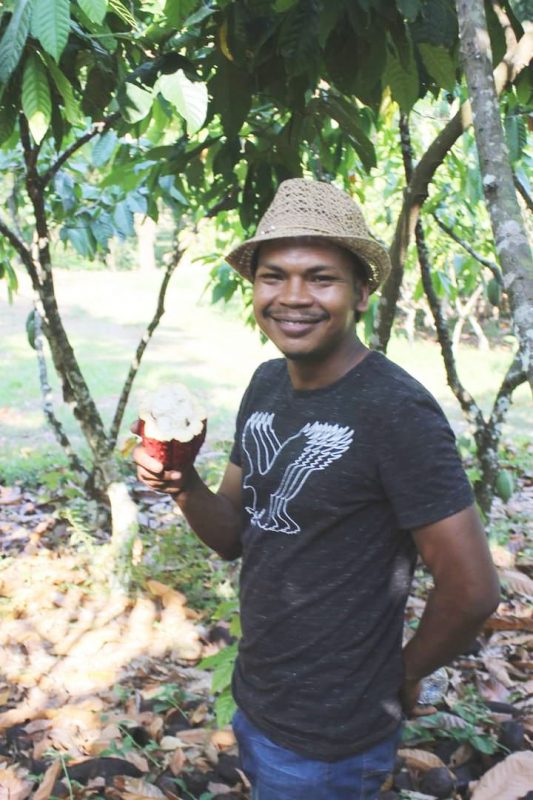Araunama is the Lokono/Awarak word for Essequibo. The business was named after Guyana’s largest county, where most of the cocoa beans are produced for the making of the chocolate. It is also the Campbell’s home county; he was born in Moruca.
No stranger to entrepreneurship, Campbell had started a venture called Ebesowana Natural Food some years ago, through which he sold dried fruits and powdered spices. Campbell was in Trinidad in 2017, working on the restoration of the Red House, Trinidad’s parliament. He had several Guyanese friends who knew persons in the chocolate-making business, and they introduced him to members of the Alliance of Rural Communities of Trinidad and Tobago including one of the founders, Gillian Goddard, who shared some of the chocolate products made there.
In 2018 he went back to Trinidad and at that point had discussions about the possibility of starting a chocolate business in Guyana. In 2019, while attending the New Fire Music Festival where he did a presentation of the way of life of Indigenous people, he met with Goddard who took him on a tour of some of the community-based chocolate factories. He was taken through the entire process: drying of the beans, fermenting, conching, and making chocolate liqueur.
Intrigued, he held further discussions and learned that the group could provide funding for a similar start-up in Guyana. The group, he noted, has helped to start up other businesses in a few other countries, but his was the first in Guyana.
With that assistance, some of the profits from Ebesowana Natural Food and a GoFundMe, Campbell was able to come up with the needed finance to start Araunama. Activist Sherlina Nageer also played a key role in raising funds to buy the necessary equipment, he said.
By July 2019, Campbell had made his first batch of chocolate. “The first batch was actually very good. I made it at 70% cocoa dark chocolate. It was really good, everybody liked it,” he enthused. “Then I did a 50% cocoa which was to be used for drinking.”
He used up a lot of this chocolate and shared some with a friend from Switzerland who was in Guyana at the time. His friend, he said, lived near to a chocolate factory in Switzerland. Campbell shared that while it was not his best, she told him she liked it even more than what was available where she lived.
“I encountered the first problem when I bought the Demerara Gold sugar. Apparently that wasn’t refined enough,” he related. Campbell learned that to get the best quality sugar, he needed to get it directly from GuySuCo. He said he learned that Demerara Gold sugar is imported and repackaged here.
Araunama chocolate is artisanal or made by hand. He said that unlike Nestle which has just been named in a child slavery class action lawsuit, his business is supplied with beans from farmers in the working class. “I do not support slave labour,” stated Campbell.
Guyana, according to Campbell, produces the three main varieties of cocoa: Forastero, Criollo and Trinitario, said to be the best in the world. He sources his cocoa beans from the Blue Flames Women’s Group in Hosororo, North West District, Pomeroon and other places in Guyana.
Owing to the pandemic, Campbell said, he was on the verge of selling his chocolate-making equipment as the hinterland areas were locked down and he could not source the cocoa beans he needed. However, he has since been able to cover his expenses. In addition to making life more sustainable, Campbell has begun planting his own kitchen garden which he started last May. He has not had to buy vegetables.
The entrepreneur is currently supplying farmers with cocoa plants and said that once these plants start to bear, he will be purchasing the cocoa beans from them. This is a long-term initiative as cocoa plants take eight years to produce. However, since a plant keeps producing for 65 to 90 years, both he and the farmers can benefit in the long run. Campbell said two grown cocoa plants can take care of a third of a small family’s utility bills for a year.
Campbell’s chocolates are currently being made to order and he uses simple packaging – parchment paper. He has a food handler’s certificate but needs to be certified by the Food and Drug Department before his chocolate bars can make it to the shelves of local supermarkets and shops. At present he is working towards making this a reality.
Campbell said that for the most part he is still experimenting and his mainly couverture chocolate can be sampled at the cost of $600 per 31 grammes bar. He is hoping to have an 85 grammes bar available soon.
At present, Campbell has available 85% dark chocolate, 65% dark chocolate, 70% dark chocolate with turmeric, 70% dark chocolate with turmeric and ginger, and 70% dark chocolate.
For more information Campbell can be contacted at Araunama Chocolate Company of Guyana on Facebook or by telephone number 665-8306.
